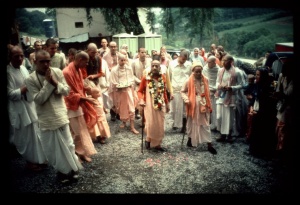CC Antya 10.140-141: Difference between revisions
m (1 revision(s)) |
No edit summary |
||
| Line 1: | Line 1: | ||
{{ | [[Category:Sri Caitanya-caritamrta - Antya-lila Chapter 10|CC141]] | ||
<div style="float:left">'''[[Sri Caitanya-caritamrta|Śrī Caitanya-caritāmṛta]] - [[CC Antya|Antya-līlā]] - [[CC Antya 10|Chapter 10: Śrī Caitanya Mahāprabhu Accepts Prasādam from His Devotees]]'''</div> | |||
<div style="float:right">[[File:Go-previous.png|link=CC Antya 10.139|Antya-līlā 10.139]] '''[[CC Antya 10.139|Antya-līlā 10.139]] - [[CC Antya 10.142|Antya-līlā 10.142]]''' [[File:Go-next.png|link=CC Antya 10.142|Antya-līlā 10.142]]</div> | |||
{{CompareVersions|CC|Antya 10.140-141|CC 1975|CC 1996}} | |||
{{RandomImage}} | |||
==== TEXTS 140-141 ==== | ==== TEXTS 140-141 ==== | ||
<div | <div class="verse"> | ||
ei-mata nimantraṇa karena yatna kari | :ei-mata nimantraṇa karena yatna kari | ||
vāsudeva, gadādhara-dāsa, gupta-murāri | :vāsudeva, gadādhara-dāsa, gupta-murāri | ||
kulīna-grāmī, khaṇḍa-vāsī, āra yata jana | :kulīna-grāmī, khaṇḍa-vāsī, āra yata jana | ||
jagannāthera prasāda āni’ kare nimantraṇa | :jagannāthera prasāda āni’ kare nimantraṇa | ||
</div> | </div> | ||
| Line 14: | Line 18: | ||
==== SYNONYMS ==== | ==== SYNONYMS ==== | ||
<div | <div class="synonyms"> | ||
ei- | ''ei-mata''—like this; ''nimantraṇa''—invitation; ''karena''—execute; ''yatna kari''—with devotion; ''vāsudeva''—Vāsudeva; ''gadādhara-dāsa''—Gadādhara dāsa; ''gupta-murāri''—Murāri Gupta; ''kulīna-grāmī''—the inhabitants of Kulīna-grāma; ''khaṇḍa-vāsī''—the inhabitants of Khaṇḍa; ''āra''—and; ''yata jana''—many other persons; ''jagannāthera prasāda''—remnants of the food of Jagannātha; ''āni'' '—bringing; ''kare nimantraṇa''—invite. | ||
</div> | </div> | ||
| Line 21: | Line 25: | ||
==== TRANSLATION ==== | ==== TRANSLATION ==== | ||
<div | <div class="translation"> | ||
They would extend invitations to the Lord. Vāsudeva Datta, Gadādhara dāsa, Murāri Gupta, the inhabitants of Kulīna-grāma and Khaṇḍa and many other devotees who were not brāhmaṇas by caste would purchase food offered to Lord Jagannātha and then extend invitations to Śrī Caitanya Mahāprabhu. | They would extend invitations to the Lord. Vāsudeva Datta, Gadādhara dāsa, Murāri Gupta, the inhabitants of Kulīna-grāma and Khaṇḍa and many other devotees who were not brāhmaṇas by caste would purchase food offered to Lord Jagannātha and then extend invitations to Śrī Caitanya Mahāprabhu. | ||
</div> | </div> | ||
| Line 28: | Line 32: | ||
==== PURPORT ==== | ==== PURPORT ==== | ||
<div | <div class="purport"> | ||
The inhabitants of Kulīna-grāma, such as Satyarāja Khān and Rāmānanda Vasu, were not brāhmaṇas by caste, nor were the inhabitants of Khaṇḍa, such as Mukunda dāsa, Narahari dāsa and Raghunandana. Therefore they would purchase prasādam from the market where the remnants of Lord | The inhabitants of Kulīna-grāma, such as Satyarāja Khān and Rāmānanda Vasu, were not ''brāhmaṇas'' by caste, nor were the inhabitants of Khaṇḍa, such as Mukunda dāsa, Narahari dāsa and Raghunandana. Therefore they would purchase ''prasādam'' from the market where the remnants of Lord Jagannātha's food was sold and then extend invitations to Śrī Caitanya Mahāprabhu, whereas Ācāryaratna, Ācāryanidhi and others who were ''brāhmaṇas'' by caste would cook at home when they invited the Lord. Caitanya Mahāprabhu observed the etiquette then current in society by accepting only ''prasādam'' cooked by members of the ''brāhmaṇa'' caste, but on principle He accepted invitations from His devotees, regardless of whether they were ''brāhmaṇas'' by caste. | ||
</div> | </div> | ||
__NOTOC__ | |||
<div style="float:right; clear:both;">[[File:Go-previous.png|link=CC Antya 10.139|Antya-līlā 10.139]] '''[[CC Antya 10.139|Antya-līlā 10.139]] - [[CC Antya 10.142|Antya-līlā 10.142]]''' [[File:Go-next.png|link=CC Antya 10.142|Antya-līlā 10.142]]</div> | |||
__NOTOC__ | |||
__NOEDITSECTION__ | |||
Revision as of 05:06, 23 September 2021

A.C. Bhaktivedanta Swami Prabhupada
TEXTS 140-141
- ei-mata nimantraṇa karena yatna kari
- vāsudeva, gadādhara-dāsa, gupta-murāri
- kulīna-grāmī, khaṇḍa-vāsī, āra yata jana
- jagannāthera prasāda āni’ kare nimantraṇa
SYNONYMS
ei-mata—like this; nimantraṇa—invitation; karena—execute; yatna kari—with devotion; vāsudeva—Vāsudeva; gadādhara-dāsa—Gadādhara dāsa; gupta-murāri—Murāri Gupta; kulīna-grāmī—the inhabitants of Kulīna-grāma; khaṇḍa-vāsī—the inhabitants of Khaṇḍa; āra—and; yata jana—many other persons; jagannāthera prasāda—remnants of the food of Jagannātha; āni '—bringing; kare nimantraṇa—invite.
TRANSLATION
They would extend invitations to the Lord. Vāsudeva Datta, Gadādhara dāsa, Murāri Gupta, the inhabitants of Kulīna-grāma and Khaṇḍa and many other devotees who were not brāhmaṇas by caste would purchase food offered to Lord Jagannātha and then extend invitations to Śrī Caitanya Mahāprabhu.
PURPORT
The inhabitants of Kulīna-grāma, such as Satyarāja Khān and Rāmānanda Vasu, were not brāhmaṇas by caste, nor were the inhabitants of Khaṇḍa, such as Mukunda dāsa, Narahari dāsa and Raghunandana. Therefore they would purchase prasādam from the market where the remnants of Lord Jagannātha's food was sold and then extend invitations to Śrī Caitanya Mahāprabhu, whereas Ācāryaratna, Ācāryanidhi and others who were brāhmaṇas by caste would cook at home when they invited the Lord. Caitanya Mahāprabhu observed the etiquette then current in society by accepting only prasādam cooked by members of the brāhmaṇa caste, but on principle He accepted invitations from His devotees, regardless of whether they were brāhmaṇas by caste.